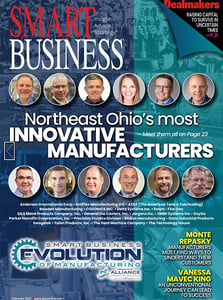Long-term planning has never felt more like guesswork…
Bill Nottingham | Smart Business Cleveland
I’ve had more conversations over the past year and a half about what’s coming next than in the previous decade. The pandemic has shaken everyone’s sense of how quickly and radically entire industries can change.
Long-term planning has never felt more like guesswork, at least not in my lifetime. But by changing the way we plan, we can adapt.
In their 2017 book Sense and Respond: How Successful Organizations Listen to Customers and Create New Products Continuously, authors Jeff Gothelf and Josh Seiden present the idea of “continuous everything.” They maintain that it’s not enough for companies to be technologically nimble, they need to adopt “a management model that doesn’t merely account for, but actually embraces, continuous change.”
“Traditional management (from the manufacturing era) holds a deliberate point of view,” Gothelf explained in an interview with Disruptor League. “This view states that managers know what the teams need to do, how they need to do it and how long it should take. They then dictate these requirements to the teams to execute. Continuous learning allows for an emergent mindset. This is a humble point of view that embraces the uncertainty of technology. It allows teams, managers and companies to learn, continuously, how they are meeting customer needs and ways they could potentially improve. At the center of this mindset is the belief that framing success as customer value, not the deployment of features or products, is the best approach to success.”
What does this look like in practice?
“Be humble,” Gothelf advised. “You can’t predict the future. You can only guess it. Trust your teams. They are closest to the customer. Let their work guide your decisions.”
This will be difficult to implement for some executives, who will fear wasting time on dead-end pursuits based on input from fickle customers. But I contend that time spent innovating is never wasted. Practice is the only route to mastery.

And ideas that turn out to be unworkable might just be ahead of their time. Timing is critical, but it doesn’t have to be an impediment to new ideas. At Nottingham Spirk, we keep an “innovation library” of concepts we developed but shelved because we didn’t find the right partner, or the market changed, or some other reason related to timing. But as circumstances change, these ideas can become an open invitation for us to partner with another company, or even launch a new business altogether.
Finally, there is the truth that every successful artist knows, and that smart businesses should learn.
“You need a lot of bad ideas in order to get a few good ones,” says Adam Grant, Wharton professor and author of Originals: How Non-conformists Move the World. “Good” and “bad” are simplistic terms — again, timing matters — but I wholeheartedly agree with the general sentiment. Listen, work, repeat, ad infinitum. This is the way.
The companies that commit to it will be the ones that are best positioned to adapt to whatever the world throws at us next.
About Nottingham Spirk
Nottingham Spirk is an established leader in disruptive innovation, partnering with companies to create thriving new business innovations that propel economic growth. Since 1972, the privately owned company has served as a beacon of innovation for organizations pursuing uncharted territory to accelerate growth and improve life experiences. Learn more about why Nottingham Spirk is a trusted leader in innovation.

Submit a comment